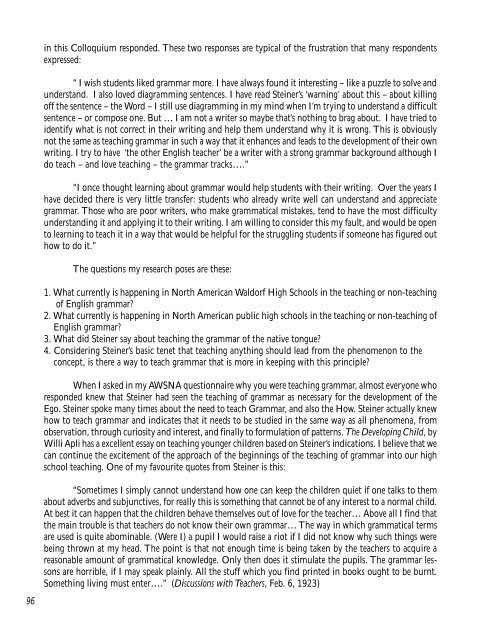Colloquium on English - Research Institute for Waldorf Education
Colloquium on English - Research Institute for Waldorf Education
Colloquium on English - Research Institute for Waldorf Education
You also want an ePaper? Increase the reach of your titles
YUMPU automatically turns print PDFs into web optimized ePapers that Google loves.
96<br />
in this <str<strong>on</strong>g>Colloquium</str<strong>on</strong>g> resp<strong>on</strong>ded. These two resp<strong>on</strong>ses are typical of the frustrati<strong>on</strong> that many resp<strong>on</strong>dents<br />
expressed:<br />
“ I wish students liked grammar more. I have always found it interesting – like a puzzle to solve and<br />
understand. I also loved diagramming sentences. I have read Steiner’s ‘warning’ about this – about killing<br />
off the sentence – the Word – I still use diagramming in my mind when I’m trying to understand a difficult<br />
sentence – or compose <strong>on</strong>e. But … I am not a writer so maybe that’s nothing to brag about. I have tried to<br />
identify what is not correct in their writing and help them understand why it is wr<strong>on</strong>g. This is obviously<br />
not the same as teaching grammar in such a way that it enhances and leads to the development of their own<br />
writing. I try to have ‘the other <strong>English</strong> teacher’ be a writer with a str<strong>on</strong>g grammar background although I<br />
do teach – and love teaching – the grammar tracks….”<br />
“I <strong>on</strong>ce thought learning about grammar would help students with their writing. Over the years I<br />
have decided there is very little transfer: students who already write well can understand and appreciate<br />
grammar. Those who are poor writers, who make grammatical mistakes, tend to have the most difficulty<br />
understanding it and applying it to their writing. I am willing to c<strong>on</strong>sider this my fault, and would be open<br />
to learning to teach it in a way that would be helpful <strong>for</strong> the struggling students if some<strong>on</strong>e has figured out<br />
how to do it.”<br />
The questi<strong>on</strong>s my research poses are these:<br />
1. What currently is happening in North American <strong>Waldorf</strong> High Schools in the teaching or n<strong>on</strong>-teaching<br />
of <strong>English</strong> grammar?<br />
2. What currently is happening in North American public high schools in the teaching or n<strong>on</strong>-teaching of<br />
<strong>English</strong> grammar?<br />
3. What did Steiner say about teaching the grammar of the native t<strong>on</strong>gue?<br />
4. C<strong>on</strong>sidering Steiner’s basic tenet that teaching anything should lead from the phenomen<strong>on</strong> to the<br />
c<strong>on</strong>cept, is there a way to teach grammar that is more in keeping with this principle?<br />
When I asked in my AWSNA questi<strong>on</strong>naire why you were teaching grammar, almost every<strong>on</strong>e who<br />
resp<strong>on</strong>ded knew that Steiner had seen the teaching of grammar as necessary <strong>for</strong> the development of the<br />
Ego. Steiner spoke many times about the need to teach Grammar, and also the How. Steiner actually knew<br />
how to teach grammar and indicates that it needs to be studied in the same way as all phenomena, from<br />
observati<strong>on</strong>, through curiosity and interest, and finally to <strong>for</strong>mulati<strong>on</strong> of patterns. The Developing Child, by<br />
Willi Apli has a excellent essay <strong>on</strong> teaching younger children based <strong>on</strong> Steiner’s indicati<strong>on</strong>s. I believe that we<br />
can c<strong>on</strong>tinue the excitement of the approach of the beginnings of the teaching of grammar into our high<br />
school teaching. One of my favourite quotes from Steiner is this:<br />
“Sometimes I simply cannot understand how <strong>on</strong>e can keep the children quiet if <strong>on</strong>e talks to them<br />
about adverbs and subjunctives, <strong>for</strong> really this is something that cannot be of any interest to a normal child.<br />
At best it can happen that the children behave themselves out of love <strong>for</strong> the teacher… Above all I find that<br />
the main trouble is that teachers do not know their own grammar… The way in which grammatical terms<br />
are used is quite abominable. (Were I) a pupil I would raise a riot if I did not know why such things were<br />
being thrown at my head. The point is that not enough time is being taken by the teachers to acquire a<br />
reas<strong>on</strong>able amount of grammatical knowledge. Only then does it stimulate the pupils. The grammar less<strong>on</strong>s<br />
are horrible, if I may speak plainly. All the stuff which you find printed in books ought to be burnt.<br />
Something living must enter….” (Discussi<strong>on</strong>s with Teachers, Feb. 6, 1923)

















